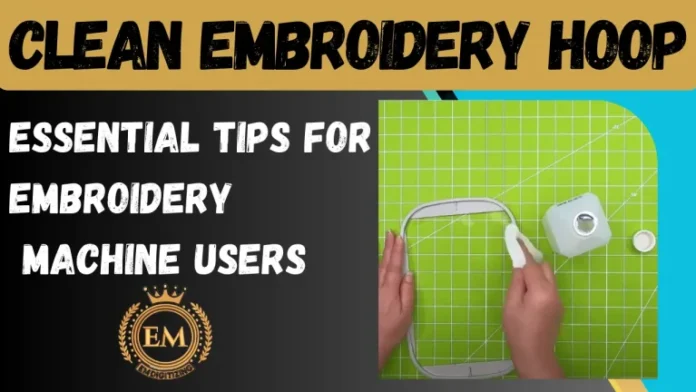Embroidery has been a beloved art form for centuries, transforming simple fabrics into intricate designs with just a needle and thread. Modern embroidery machines have made this craft more accessible and efficient, allowing for complex designs to be created with ease. However, one of the essential components that can affect the quality of your embroidery is the embroidery hoop. Keeping your embroidery hoop clean is crucial for achieving precise and professional results. In this guide, we’ll explore essential tips for maintaining a clean embroidery hoop and ensure your embroidery projects shine every time.
Understanding the Importance of a Clean Embroidery Hoop
A clean embroidery hoop is vital for several reasons:
- Precision in Design: A dirty hoop can cause your fabric to slip or move, leading to misaligned stitches and uneven designs.
- Fabric Protection: Residues and dirt can damage your fabric, causing stains or tears.
- Machine Efficiency: A clean hoop ensures that your embroidery machine functions smoothly, reducing the risk of mechanical issues.
- Professional Results: Clean tools are the foundation of professional-quality work, ensuring your embroidery projects look their best.
Essential Tips for Cleaning Your Embroidery Hoop
1. Regular Cleaning Routine
Establish a regular cleaning routine for your embroidery hoop. After each project, take a few minutes to wipe down the hoop with a soft, dry cloth to remove any loose threads and dust. This simple habit can prevent the buildup of grime over time.
2. Use Gentle Cleaning Solutions
For more thorough cleaning, use a gentle cleaning solution. Mix a small amount of mild detergent with warm water. Dampen a soft cloth with the solution and gently wipe the hoop. Avoid using harsh chemicals or abrasive materials, as they can damage the hoop’s surface.
3. Remove Sticky Residues
Sticky residues from adhesives or stabilizers can accumulate on the hoop, affecting its grip on the fabric. To remove these residues, use rubbing alcohol or a specialized adhesive remover. Apply a small amount to a cloth and gently rub the affected areas. Ensure the hoop is completely dry before using it again.
4. Inspect for Damage
Regularly inspect your embroidery hoop for signs of wear and tear. Cracks, chips, or rough edges can catch on the fabric and cause issues during embroidery. If you notice any damage, consider replacing the hoop to maintain the quality of your work.
5. Store Properly
Proper storage is essential for keeping your embroidery hoop clean and in good condition. Store the hoop in a dry, dust-free environment. Avoid placing heavy objects on top of the hoop, as this can warp its shape.
Specialized Cleaning Tips for Different Hoop Types
Wooden Hoops
Wooden hoops require special care to prevent damage. Avoid soaking wooden hoops in water, as this can cause the wood to swell and warp. Instead, wipe them down with a slightly damp cloth and dry immediately. Periodically, treat the wood with a wood conditioner to maintain its integrity and prevent cracking.
Plastic Hoops
Plastic hoops are more resistant to moisture but can still accumulate grime and residues. Clean plastic hoops with mild detergent and water, as described earlier. For stubborn residues, use a non-abrasive plastic cleaner.
Incorporating Digitizing USA and Logo Digitizing
The quality of your embroidery projects isn’t solely dependent on a clean hoop. The digitizing process, particularly when dealing with logo digitizing, plays a crucial role. Digitizing USA offers top-notch services for converting images into embroidery-ready designs, ensuring precise and professional results. When your designs are expertly digitized, you can achieve cleaner and more accurate embroidery, complementing the cleanliness of your hoop.
Conclusion
Maintaining a clean embroidery hoop is essential for achieving professional and precise embroidery results. By incorporating regular cleaning routines and using appropriate cleaning methods, you can extend the life of your hoop and enhance the quality of your embroidery projects. Additionally, leveraging expert digitizing services, such as those offered by digitizing usa, ensures your designs are accurately translated into beautiful embroidery. With these tips and best practices, your embroidery machine will continue to produce stunning works of art, stitch after stitch.
FAQs
Q1: How often should I clean my embroidery hoop?
A1: It’s best to wipe down your embroidery hoop after each use to prevent the buildup of dirt and residues. A more thorough cleaning can be done once a month or as needed, depending on how frequently you use the hoop.
Q2: Can I use household cleaners to clean my embroidery hoop?
A2: It’s advisable to use mild detergents and gentle cleaning solutions. Avoid harsh chemicals and abrasive cleaners, as they can damage the hoop’s surface and affect its performance.
Q3: What should I do if my hoop gets damaged?
A3: Inspect your hoop regularly for signs of damage. If you notice cracks, chips, or rough edges, it’s best to replace the hoop to ensure the quality of your embroidery work.
Q4: How do I remove sticky residues from my hoop?
A4: Sticky residues can be removed using rubbing alcohol or a specialized adhesive remover. Apply a small amount to a cloth and gently rub the affected areas. Make sure the hoop is completely dry before using it again.
Q5: How does digitizing USA enhance my embroidery projects?
A5: Digitizing USA provides expert services for converting images into embroidery-ready designs. Their precise digitizing ensures accurate and clean embroidery, enhancing the overall quality of your projects.
Q6: Why is proper storage of the embroidery hoop important?
A6: Proper storage prevents the hoop from accumulating dust and dirt. It also protects the hoop from physical damage, ensuring it maintains its shape and functionality.





